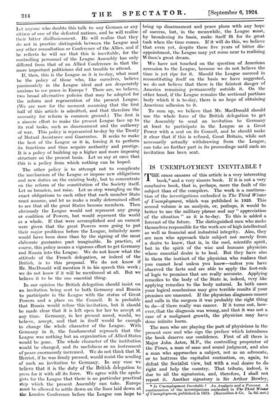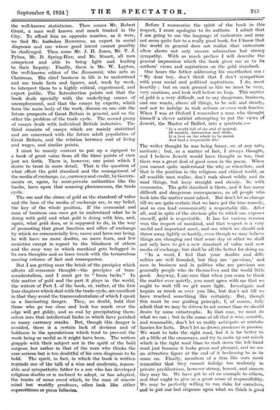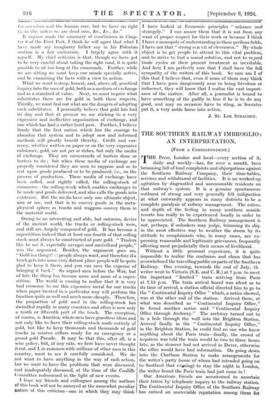IS UNEMPLOYMENT INEVITABLE ?
THE masa causans of this article is a very interesting book,* and a very sincere book. If it is not a very conclusive book, that is, perhaps, more the fault of the subject than of the compilers. The work is a continua- tion of the investigations embodied in The Third Winter of Unemployment, which was published in 1923. This second volume is an analysis, or, perhaps, it would be better to use the military phrase and say " appreciation of the situation " as it is to-day. To this is added a forecast of the future. The distinguished men who make themselves responsible for the work are of high intellectual as well as financial and industrial integrity. Also, they are men who approach their subject not merely from a desire to know, that is, in the cool, scientific spirit, but in the spirit of the wise and humane physician whose essential desire is to heal. But they have also in them the instinct of the physician who realizes that you cannot heal unless you know—unless you have observed the facts and are able to apply the foot-rule of logic to premises that are really accurate. Applying remedies to the body of the State is, indeed, very like applying remedies to the body natural. In both cases your logical conclusions may give terrible results if your premises are unsound. If the physician diagnoses cancer and calls in the surgeon it was probably the right thing to do—if there really was cancer. If it turns out, how- ever,that the diagnosis was wrong, and that it was not a case of a malignant growth, the physician may have done infinite harm.
The men who are playing the part of physicians in the present case and who sign the preface which introduces the book deserve our confidence. First of all there is Major John Astor, M.P., the controlling proprietor of the Times, a man of sane and sound judgment, and also a man who approaches a subject, not as an advocate, or to buttress the capitalist contention, or, again, to defeat the Socialist view, but with a real desire to do right and help the country. That tribute, indeed, is due to all the signatories, and, therefore, I shall not repeat it. Another signatory is Sir Arthur Bowley, * /8 Unemployment Inevitable ? An Analysis and a Forecast. A continuation of the investigations embodied in The Third Winter of Unemployment, published in 1923. (Macmillan & Co. 7e. 6d. net.) the well-known statistician. Then comes Mr. Robert Grant, a man well known and much trusted in the City. To afford him an opposite number, as it were, we find Mr. Seebohm Rowntree, an expert in social diagnosis and one whose good intent cannot possibly be challenged. Then come Mr. J. H. Jones, Mr. P. J. Pybus, Mr. D. Spring-Rice, and Mr. Stuart, all men competent and able to bring light and leading to their Inquiry. Finally, there is Mr. W. Layton, the well-known editor of the Economist, who acts as Chairman. His chief business in life is to understand and use trade facts and figures, and, week by week, to interpret them to a highly critical, experienced, and expert public. The Introduction points out that the book deals specially with the underlying causes of unemployment, and that the essays by experts, which form the main body of the work, discuss on one side the future prospects. of Great -Britain in general, and on the other the problem of the trade cycle. The second group of essays deals with individual British industries. The third consists of essays which are mainly statistical and are concerned with the future adult population of Great Britain and the relation between cost of living and wages, and similar points.
I must be mainly content to put up a signpost to a book of great value from all the three points of view just set forth. There is, however, one point which I desire to treat in more detail. That is the question of what effect the gold standard and the management of the media of exchange, i.e., currency and credit, by Govern- ments or, again, by semi-private authorities like the banks, have upon that amazing phenomenon, the trade cycle.
The use and the abuse of gold as the standard of value and the base of the media of exchange are, in my belief, the key of the whole position. If the economist and man of business- can once get to understand what he is doing with gold and what gold is doing with him, and, again, what gold does, or is supposed to do, in the way of promoting that great function and office of exchange by which we commercially live, move and have our being, he will have no more doubts, no more fears, and few anxieties except in regard to the blindness of others and the easy way in which mankind gets befogged in its own thoughts and so loses touch with the tremendous moving column of fact and consequence.
But I am getting near the brink of the precipice which affects all economic thought—the precipice of tran- scendentalism, and I must get to " brass tacks." In this matter of gold and the part it plays in the world, the writers of Part I. of the book, or, rather, of the first four chapters which deal with the trade cycle, are excellent in that they avoid the transcendentalism of which I speak as a fascinating danger. They, no doubt, hold that those who go too close and look too much over the edge will get giddy, and so end by precipitating them- selves into that intellectual limbo in which have perished so many currency cranks. But, though this danger is avoided, there is a certain lack of decision and of boldness in the speculations which tend to prevent the work being as useful as it might have been. The writers grapple with their subject not in the spirit of the bold surgeon but rather in that of the man who thinks the case•serious but is too doubtful of his own diagnosis to be bold. The spirit, in fact, in which the book is written reminds one of the talk of a wise and moderate, reason- able and sympathetic father to a son who has developed religious doubts or is inclined to adopt, or has adopted, the tenets of some creed which, to the man of sincere mind but worldly prudence, often look like either superstitions or pious fallacies. Before I summarize the spirit of the book in this respect, I must apologize to its authors. I admit that I am going to use the language of caricature and may not seem quite fair to a really good book, for I know that the world in general does not realize that caricature often shows not only sincere admiration but strong sympathy. With so much preface I will describe the general impression which the book gives me as to its authors' views and aspirations on the gold standard.
One hears the father addressing his unorthodox son : " My dear boy, don't think that I don't sympathize with your social and political aspirations. I do, most heartily ; but on such ground as this we must be very, very cautious, and look well before we leap. This matter of gold is a very difficult, not to say dangerous, business, and one wants, above all things, to be safe and steady, and not to indulge in rash actions or even rash fancies. When I was at Oxford I remember a man who thought himself a clever satirist attempting to put the views of Jowett, the Master of Balliol, into a quatrain ;- ' In a world full of sin and of quarrel. Of trouble, distraction and strife, It is best on the whole to be moral And lead a respectable life.'
The writer thought he was being funny, or, at any rate, sardonic ; but, as a matter of fact, I always thought, and I believe Jowett would have thought so too, that there was a great deal of good sense in the poem. When you cannot quite understand the why or wherefore, and that is the position in the religious and ethical world, as all sensible men realize, don't rush about wildly and do mad things, but keep straight and steady. So with economics. The gold standard is there, and it has many difficult and dangerous consequences, as all people who look into the matter must admit. But don't let us change till we are quite certain that we have got the true remedy, and so can lead economically a respectable life. After all, and in spite of the obvious gibe to which one exposes oneself, gold is respectable. It has for various reasons won the respect of mankind, and that respect is a very useful and important asset, and one which we should not throw away lightly or hastily, even though we may believe things are changing and that some day or other we shall not only have to get a new standard of value and new media of exchange, but shall be all the better for doing so.
"In a word, I feel that your doubts and diffi- culties are well founded, but they are previous,' and men in business and in politics who are previous are generally people who do themselves and the world little good. Anyway, I am sure that when you come to think the matter over quietly, you must agree with me that we ought to wait till we get more light. Investigate and inquire as much as ever you like, but don't act till we have reached something like certainty. Butz though this must be our guiding principle, I, of course, fully admit that we may be driven to act sooner than we should desire by some catastrophe. In that case, we must do what we can ; but in the name of all that is wise, sensible, and reasonable, don't let us rashly anticipate or mistake fancies for facts. Don't let us drown prudence in passion. We want to take the right road, but it is far better to sit a little at the crossways, and try to make up our minds which is the right road than to rush down the left-hand road just because it looks green and pleasant, and we see an attractive figure at the end of it beckoning to us to come on. Finally, members of a firm like ours must remember that they cannot indulge too zealously in private predilections, however strong, honest, and sincere _ they may be. We have got to set an example to others, and that ought to give us a great sense of responsibility. We may be perfectly willing to run risks for ourselves, and to put our last sixpence upon what we think is good for ourselves and the human race, but we have no right to do this unless we are dead sure, &c., &c., &c."
If anyone reads the summary of conclusions in Chap- ter 8 of the First Part, I think he will agree that what I have made my imaginary father say in his Polonian oration is a fair caricature. I largely agree with it myself. My chief criticism is that, though we have got to be very careful about taking the right road, it is quite possible to sit too long at the crossroads. Further, while we are sitting we must keep our minds specially active, and be examining the facts with a view to action.
What we want is deep, honest, and, above all, practical inquiry into the uses of gold, both as a medium of exchange and as a standard of value. Next, we must inquire what substitutes there are for gold in both these respects. Thirdly, we must find out what are the dangers of adopting such substitutes. I personally believe that gold has had its day and that at present we arc sticking to a very expensive and ineffective organization of exchange, and one which has had a rather lurid past. Further, I believe firmly that the first nation which has the courage to abandon that system and to adopt new and reformed methods will greatly benefit thereby. Credit and cur- rency, whether written on paper or on the very expensive substance, gold, are not per se riches, but only the media of exchange. They are memoranda of barters done or barters to do ; but when these media of exchange are properly considered they are seen to suppose and so to rest upon goods produced or to be produced, i.e., on the process of production. These media of exchange have been called, and rightly called, the rolling-stock of commerce—the rolling-stock which enables exchanges to be made and goods delivered, and also calls the goods into existence. But the media have only one ultimate object, aim or use, and that is to convey goods in the meta- physical sphere as trucks and waggons convey them in the material world.
Owing to an interesting and able, but outworn, device of the ancient world, the trucks or rolling-stock were, and still arc, largely composed of gold. It has become a superstition indeed that at least one-fourth of that rolling stock must always be constructed of pure gold. " Traders like to see it, especially savages and uncivilized people," was the argument. Besides, the argument goes on, " Gold is a thing tl people always want, and therefore if a truck gets into some very distant place people will be quite glad to keep it there, and you can save the expense of bringing it back." So argued men before the War, but of late the thing has become more and more of a super- stition. The world is coming to realize that it is very bad economy to use this expensive metal for our trucks when paper treated in a particular way will perform the function quite as well and much more cheaply. Therefore, the proportion of gold used in the rolling-stock has dwindled rapidly in many countries and often is now only a tenth or fifteenth part of the truck. The exception, of course, is America, where men have grandiose ideas and not only like to have their rolling-stock made entirely of gold, but like to keep thousands and thousands of gold trucks in reserve cellars ready for an emergency or a grand gold Parade. It may be that this, after all, is a wise policy, but, at any rate, we here have never thought it out, and I, in common with millions of other men in this country, want to see it carefully considered. We do not want to have anything in the way of rash action, but we want to have the problems that were diicussed, and inadequately discussed, at the time of the Cunliffe Committee rediscussed in the light of new events.
I hope my friends and colleagues among the authors of this book will not be annoyed at the somewhat peculiar nature of this criticism—one in which they may think I have looked at Economic principles " askance and strangely." I can assure them that it is not from any want of proper respect for their work or because I think I have a monopoly of understanding in these perilous fields. I have not that "strong ccn2eit of cleverness." My whole object is to get people to attend to this vital problem, and to strive to find a sound solution, and not to regard trade cycles or their present :treatment as inevitable. And here I am perfectly sure that I shall have the full sympathy of the writers of this book. So sure am I of this that I believe that, even if some of them may think that I have gone dangerously near to being frivolous or indiscreet, they will know that I realize the vast import- ance of the matter. After all, a journalist is bound to have something of the gadfly in him if he is to do any good, and may on occasion have to sting, as Socrates put it, a very noble horse into action.
J. S. LOE STRACHEY.








































 Previous page
Previous page